Topline
World-leading AIDS researcher, South African Quarraisha Abdool Karim, has been elected to serve as the seventh President of The World Academy of Sciences for the advancement of science in developing countries (UNESCO-TWAS).
Key Facts
A Professor in Clinical Epidemiology at Columbia University, USA, and pro-Vice Chancellor for African Health at the University of KwaZulu-Natal, South Africa, Abdool Karim will serve as president from 2023 until 2026. The South African professor succeeds Sudanese mathematician Professor Mohamed Hassan.
“It is a real honor and privilege to be elected as President of TWAS,” said Abdool Karim in a statement released by TWAS. “And to have the opportunity to build on the strong foundations established over four decades by my predecessors in realizing the aspirational vision of the founder, Nobel laureate Abdus Salam, on the use of science to improve the lives of the most vulnerable in the developing world.”
Abdool Karim was included in the Women In Science list released by FORBES AFRICA in 2021.
According to TWAS, this is the first time that the 16-member council will comprise of exactly eight men and eight women. Abdool Karim will also be the first woman to serve in the role of TWAS President. Furthermore, this is the first time the council will include a Vice-President and council member from the Global North.
The TWAS Council, elected by members every four years, is responsible for supervising all academy affairs. TWAS treasurer Korean physicist Young Hee Lee, Director of the Center for Integrated Nanostructure Physics of the Institute for Basic Science and Professor at Sungkyunkwan University in the Republic of Korea, said that Abdool Karim is an accomplished scholar, scientist and health policy leader.
“…With deep knowledge of what it takes to training developing world scientists and make a powerful real-world impact with her research… I am confident that under their guidance the Academy will not only continue to build scientific capacity through research, education, policy and diplomacy — but also expand its activities and programmes, taking TWAS to new heights,” he added.
In her statement Abdool Karim emphasized that while much progress has been made in collaboration with the global network of science academies and strategic partnerships, much more remains to be done during these socially, politically and economically challenging times.
“This is also an opportunity for scientific excellence in developing countries to flourish as we continue to find solutions to the ongoing and new challenges that face the most vulnerable in our communities,” she added. “And ensure that we can all realize our full potential as one people in a safe planet that ensures a sustainable future for all who inhabit it.”
